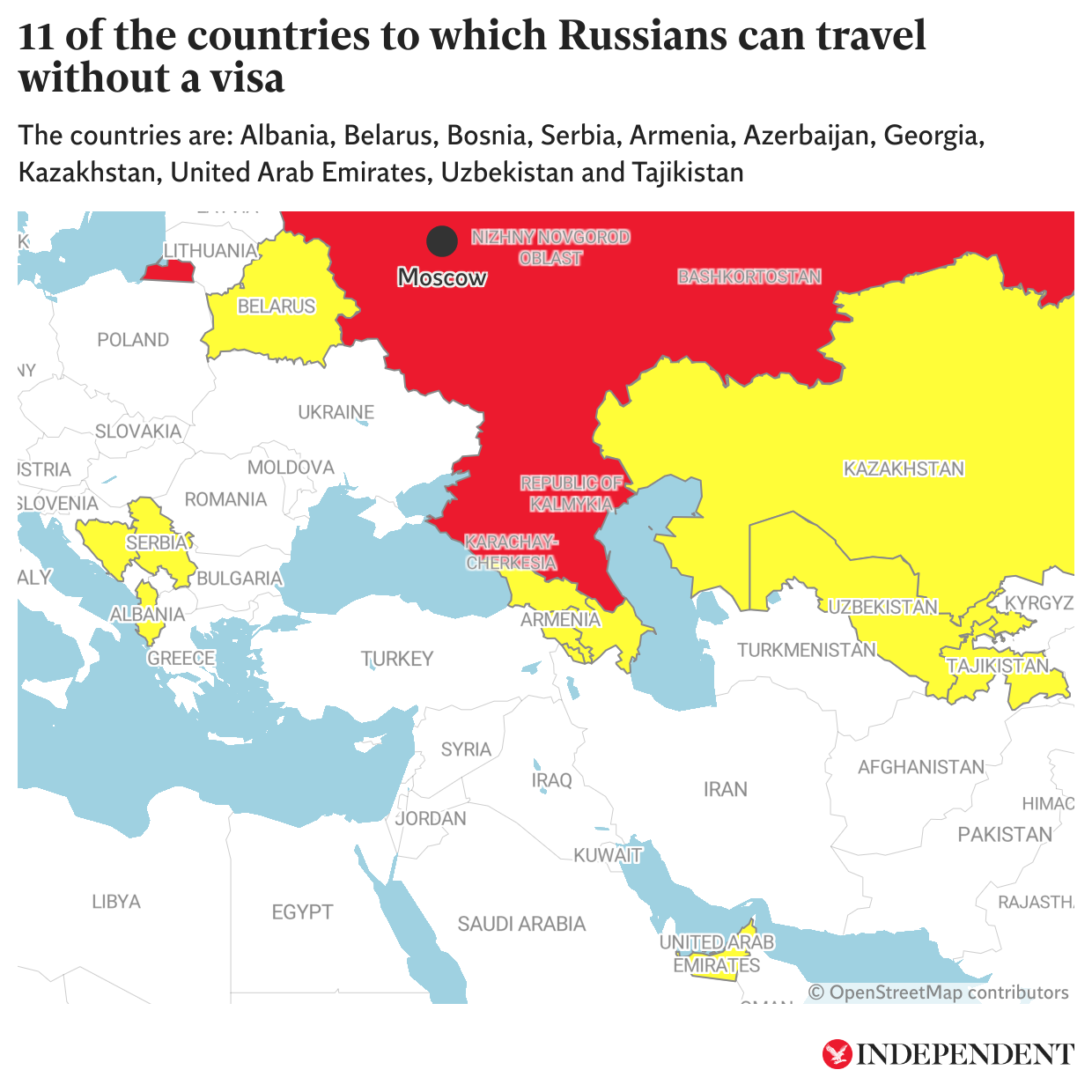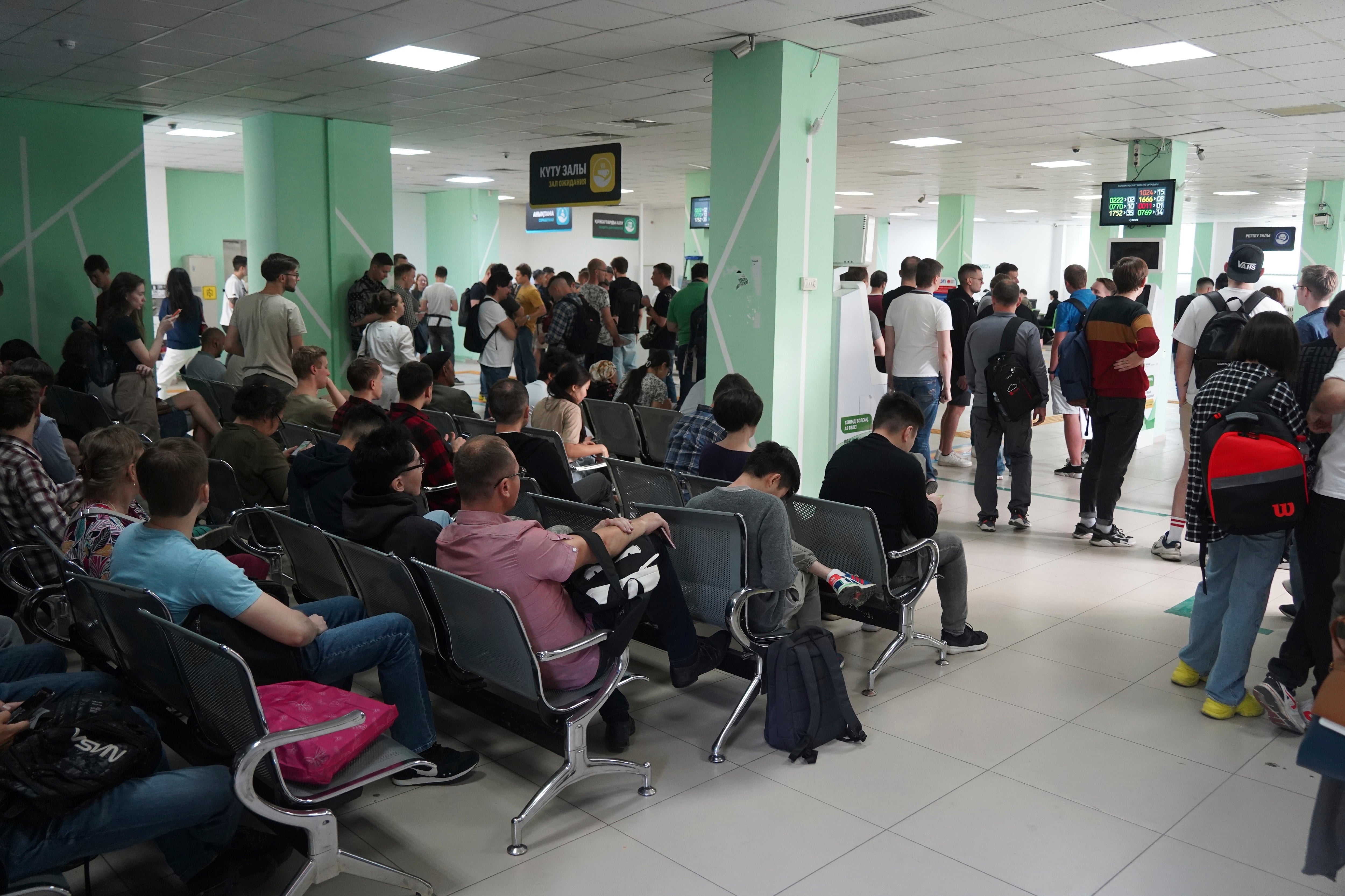Nearly 100,000 Russians cross into Kazakhstan after Putin’s mobilisation order
‘A lot of people from Russia have come here over the last few days,’ says the Kazakh president
Your support helps us to tell the story
From reproductive rights to climate change to Big Tech, The Independent is on the ground when the story is developing. Whether it's investigating the financials of Elon Musk's pro-Trump PAC or producing our latest documentary, 'The A Word', which shines a light on the American women fighting for reproductive rights, we know how important it is to parse out the facts from the messaging.
At such a critical moment in US history, we need reporters on the ground. Your donation allows us to keep sending journalists to speak to both sides of the story.
The Independent is trusted by Americans across the entire political spectrum. And unlike many other quality news outlets, we choose not to lock Americans out of our reporting and analysis with paywalls. We believe quality journalism should be available to everyone, paid for by those who can afford it.
Your support makes all the difference.Nearly 100,000 Russians have fled into neighbouring Kazakhstan following Vladimir Putin’s partial mobilisation order, government officials in Astana claim.
Kazakhstan said it is struggling to accommodate the tens of thousands of Russians who have fled their homeland since Moscow announced a military mobilisation last week, but will attempt to deal with what it called a “humanitarian matter”.
Russian men, some with families, started crossing the world's second-longest land border en masse last week after President Vladimir Putin’s announcement of a call-up, say officials.
Russians do not need a visa or even a passport to enter Kazakhstan, just their Russian identity papers. The Russian language is also widely spoken in the country, which is home to a large ethnic Russian minority.
However, the sudden influx has stretched the infrastructure of the vast but sparsely populated nation. Hotels and hostels are full, and rent has skyrocketed.
Kazakh President Kassym-Jomart Tokayev, whose administration has refused to support what Russia calls a “special military operation” in Ukraine, urged patience and tolerance.
“A lot of people from Russia have come here over the last few days,” he said in a speech on Tuesday. “Most of them were forced to leave by the desperate situation.
“We must take care of them and ensure their safety. This is a political and humanitarian matter.”
His government will discuss the situation with Moscow, he said.
Satellite images show queues of thousands of vehicles leaving Russia waiting to get into neighbouring Georgia. The other side of the road back into Russia is almost entirely clear in the pictures released by Maxar Technology, which were taken on Sunday.
It is estimated that the queue today contains nearly 6,000 vehicles.
Georgian officials said earlier that the number of Russians arriving each day has nearly doubled since President Putin announced a partial mobilisation for the war in Ukraine.

Georgia’s interior minister Vakhtang Gomelauri said: “Four to five days ago, 5,000-6,000 (Russians) were arriving in Georgia daily.
“The number has (now) grown to some 10,000 per day,” he added.
And the number of Russians entering the European Union has jumped, EU border agency Frontex said on Tuesday.
“Over the past week, nearly 66,000 Russian citizens entered the EU, more than 30 per cent [more] compared to the preceding week. Most of them arrived in Finland and Estonia,” Frontex said in a statement, referring to the week from 19 to 25 September.
Frontex said that over the last four days alone, 30,000 Russian citizens had arrived in Finland.

Russian officials have sought to play down the economic impact mobilisation may have as more than 70,000 IT sector workers left Russia soon after Moscow sent its troops into Ukraine in February, although some have since returned. The Russian Union of Industrialists and Entrepreneurs (RSPP) said the list of professions granted deferment from partial mobilisation needed to be expanded.
“The short-term departure in the workforce of a number of key personnel cannot be efficiently compensated by rapid recruitment in the market, when it comes to technological production with a high level of demands for workers' qualifications,” RSPP said in a statement.
It said key staff at backbone organisations of the economy, critical infrastructure, and those in the defence sectors should be granted deferment.

Join our commenting forum
Join thought-provoking conversations, follow other Independent readers and see their replies
Comments